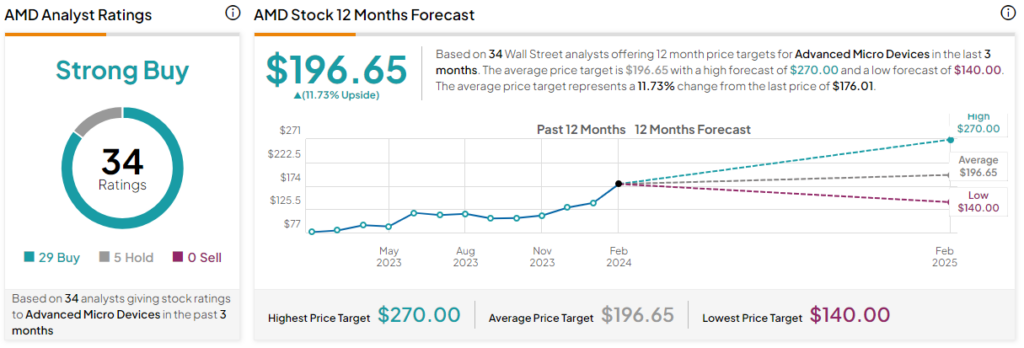Fundamentally, the bullish narrative of semiconductor and technology giant Advanced Micro Devices (NASDAQ:AMD) is intuitive and logical. However, these characteristics do not necessarily imply accuracy. Stated differently, the stratospheric ascent of AMD stock largely depends on projections for artificial intelligence to come true. However, rising evidence suggests that might not be the case, forcing me to be bearish on Advanced Micro Devices.
Discover the Best Stocks and Maximize Your Portfolio:
- See what stocks are receiving strong buy ratings from top-rated analysts.
- Filter, analyze, and streamline your search for investment opportunities with TipRanks’ Stock Screener.

AMD Stock Rides an Intriguing but Possibly Flawed Narrative
It doesn’t take much effort to understand and appreciate the bullish narrative undergirding AMD stock. Primarily, Advanced Micro manufactures graphics processing units or GPUs. These highly specialized semiconductors feed the incredible bandwidth requirements of leading generative AI platforms. Indeed, the popularity of Nvidia (NASDAQ:NVDA) stems from its world-class GPUs.
Notably, Bloomberg reported that generative AI may become a $1.3 trillion market by 2032. To support this escalated demand profile, the broader technology industry should see increased sales of GPUs. Not surprisingly, Precedence Research stated that in 2022, the global GPU sector reached a valuation of $42.2 billion. By 2032, the industry could be worth $773.07 billion, representing a compound annual growth rate of 33.8%.
Obviously, it’s not just about sheer size projections that make the AI story compelling for AMD stock and its ilk. Rather, it’s the implied economic benefits. In particular, MIT Sloan reported that a research study showed that highly skilled workers can see their performance improve by as much as 40% when using AI protocols operating within the boundaries of their capabilities.
Right now, corporations can only dream about 40% performance improvements. Therefore, it’s not surprising that more and more businesses are jumping on the AI hype train. Some companies go so far as to impose layoffs in part to invest further in AI.
Such directives can be incredibly value accretive, given the aforementioned improvement. However, the argument can only be made if AI is as good as advertised. That’s a big “if.”
Use generative AI programs long enough, and you’ll discover an intractable reality. At the moment, AI makes mistakes – too many of them. Without diving excessively into the granularity, AI suffers from a “black box” problem. Essentially, it’s difficult to understand what it’s thinking and why it arrives at the conclusions it does.
By the very nature of the problem, then, AI isn’t trustworthy. That’s not a speculative opinion but rather an argument forwarded by Harvard Business Review. Without trust, humans must oversee all the processes that AI implements. If that’s the case, why bother with the AI middleman?
Smart Money Appears Skeptical About AMD
According to an academic study last year, researchers discovered that 52% of ChatGPT answers were incorrect. That’s a startling finding if it applies to other avenues of the chatbot’s so-called expertise. If more than half the answers are inaccurate, it’s practically impossible for digital intelligence to yield a 40% performance improvement.
To Harvard Business Review’s point, you’d need a human to verify that the answers are correct. It adds another step to the process, meaning that it would have been better to go with human operators from the get-go. This is not value creation; it’s value destruction.
As a result, major entities appear skeptical about AMD stock. While Advanced Micro shares initially benefited from Nvidia’s blowout earnings, on Friday, sentiment turned negative. When the dust settled, the security lost 3% of its value. However, the derivatives market presented an even more troubling picture.
Looking at the unusual options screener for AMD stock, a good chunk of activity from both puts and calls centered on contracts that expired on the ringing of Friday’s closing bell. Here, it seems apparent that speculators attempted to scalp some quick returns based on the market’s digestion of Nvidia’s earnings.
However, traders also bought puts that expire in the months ahead. Notably, the $150 and $170 strike price puts that expire on May 17 this year saw elevated activity. It’s possible that these traders are either betting that AMD stock will fall to the aforementioned levels or are buying volatility insurance in case shares fall that much.
What may be even more eye-opening is the high volume of sold calls. Specifically, a trader (or traders) sold 4,093 contracts of the Jul 19 ’24 180.00 Call, paying a premium of $802,000 in the process. This move implies a belief that AMD stock won’t rise above the $180 strike. That seems like a rather bold bet, considering the wide enthusiasm for AI.
A Possible Valuation Readjustment May be Necessary
Assuming that the GPU market grows at around a 34% CAGR due to accelerated AI demand, AMD stock could be undervalued. Analysts, on average, call for Advanced Micro’s 2024 revenue to reach $23.83 billion and 2025 sales to land at $30 billion. From 2023’s haul of $22.7 billion, AMD’s projected sales CAGR is about 9.7%.
However, such a notion assumes that AI will be value accretive. Unfortunately, high-level sources suggest that AI is currently value consumptive. Again, its insights and output require human verification. If that’s the case, AI represents an unnecessary middleman, and that should require a value recalibration to the downside.
Is AMD Stock a Buy, According to Analysts?
Turning to Wall Street, AMD stock has a Strong Buy consensus rating based on 29 Buys, five Holds, and zero Sell ratings. The average AMD stock price target is $196.65, implying 11.7% upside potential.

The Takeaway: AMD Stock Works if AI Projections Hold True
Advanced Micro Devices could potentially be a lucrative and undervalued opportunity if AI projections hold up. However, that depends on the utility of digital intelligence and so far, the evidence suggests that AI impedes value rather than creating it. Given this surprising framework, AMD stock may require a correction, and it seems that the big traders are already operating under this assumption.









